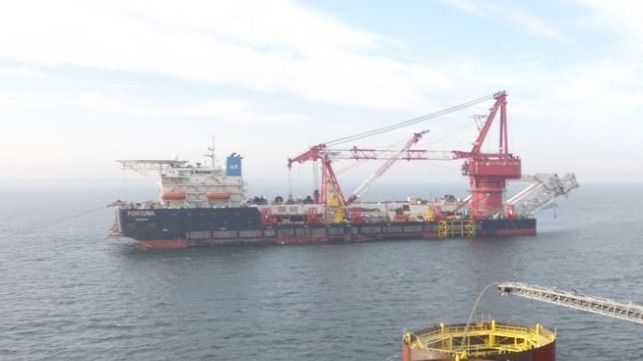Gazprom to Resume Work on Sanctioned Nord Stream 2 Pipeline

Russian natural gas company Gazprom and its partners have informed the Danish government that they plan to resume construction of the Nord Stream 2 subsea pipeline on January 15, despite newly-strengthened American sanctions.
The National Defense Authorization Act for FY2021 (NDAA) - enacted on New Years' Day - expands the scope of U.S. penalties for companies engaged in the project. The law imposes sanctions on entities that help upgrade the Russian pipelay vessels involved in the project; entities that help test, inspect or certify the pipeline; and entities that provide insurance or reinsurance for the project.
The new law has prompted class society and certification provider DNV GL to fully withdraw from its verification role in the pipeline. The announcement expands on the firm's earlier decision to suspend its activity aboard sanctioned Russian pipelay vessels, which it confirmed in November.
"We are implementing a plan to wind down our verification support to the project. As the situation currently stands, DNV GL cannot issue a certificate upon the completion of the pipeline," DNV GL told EU Observer on January 4.
A previous round of congressionally-mandated sanctions was imposed in December 2019, and it created penalties targeted at top executives at any shipowner contracted for pipelay operations for Nord Stream 2. The prospect of sanctions prompted sole contractor Allseas to back out, leaving the project without pipelay capability.
Replacing Allseas' vessels with Russian-owned pipelay assets took months, but the effort was ultimately successful, and the Russian pipelay barge Fortuna laid the last segment in German waters at the end of December. The only section of the pipeline that still remains to be completed is a stretch of roughly 50 nautical miles through Danish waters. 93 percent of the total length - under the Baltic between Denmark and Russia - has already been laid.
Foundation serves as supply intermediary
Completion of Nord Stream 2 is a priority for the German government, which views it as a secure source of reduced-carbon energy for the national economy. The German state of Mecklenburg-Western Pomerania - where the pipeline will make landfall - has announced a decision to set up a foundation to purchase supplies on behalf of the Nord Stream 2 AG consortium, primarily using funds provided by Nord Stream 2. The objective is to insulate suppliers from exposure to American sanctions, which might apply if they conducted business with the pipeline operator directly.

that matters most
Get the latest maritime news delivered to your inbox daily.
“We are firmly convinced that the Baltic Sea pipeline is necessary for the success of the energy transition,” state premier Manuela Schwesig told reporters this week. “If we are to phase out coal power and nuclear energy, then we need a transition technology.”
A state-level vote to create the foundation is expected Thursday, and it could begin operations within days - just in time for the final stretch.
